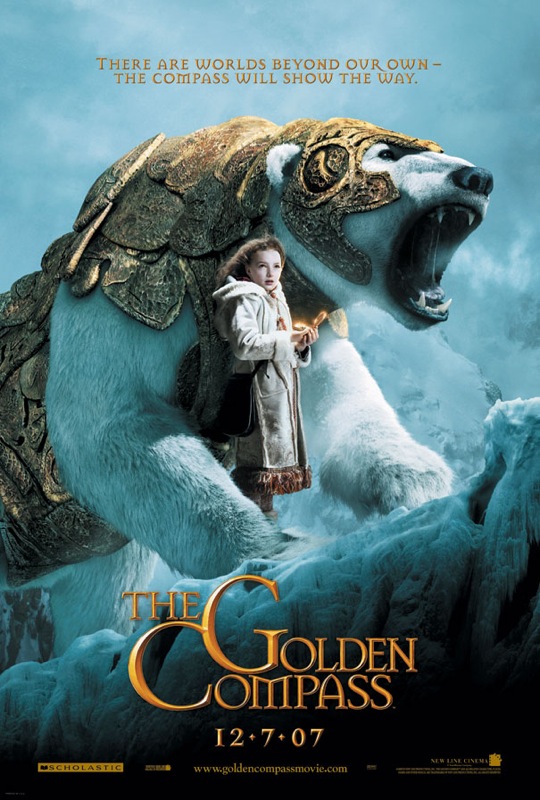 You know the verse.
You know the verse.“And the serpent said unto the woman, Ye shall not surely die: for God doth know that in the day ye eat thereof, then your eyes shall be opened, and your daemons shall assume their true forms, and ye shall be as gods; knowing good and evil.”
Not quite how you remembered it?
The biblical quote was tweaked by children’s author Phillip Pullman, whose fantasies are set to revisit the world December 7th, as New Line Cinema releases their version of Pullman’s celebrated novel, The Golden Compass. In an alternate England where Church is State and every human is attended by an animal counterpart, or daemon, the film tells of an orphan girl who travels from Oxford to the North in search of a kidnapped friend. Along the way she discovers comrades among the oppressed and enemies among the oppressors.
A common storyline. What is everyone so upset about? According to Catholics, Pullman might have been a bit nicer to the Church (they’re his villains), but isn’t it just make-believe? Perhaps.
For hundreds of years, make-believe places—Heorot to Middle Earth—have given us a clearer view of our own world. Readers set aside everyday life to peer onto another stage, where right and wrong are played out unequivocally, and when the curtains close, we love good all the more having known men like Aragon, and despise evil worse than ever having confronted murderers like the Nine. Young imaginations are especially receptive of supposals, as Jesus recognized when he told followers to receive the kingdom of God as little children.

But what if a writer, harnessing fantasy’s power, invited kids to suspend traditional beliefs about God, authority and growing up, for completely new assumptions? Just as the serpent whispered, Ye shall not surely die, the stories of such an author could circulate a new paradigm where a loving, omnipotent God and an afterlife in heaven were cruel lies. Consequently, man’s rebellion against God would be revealed as a liberation from Him, with Eve becoming a heroine who rejected blind obedience for the sake of curiosity and an inquiring mind. That writer is Phillip Pullman.
The Golden Compass is his auspicious opening of an increasingly didactic trilogy geared toward young readers. The engaging plot, action and colorful characters hook children, but Pullman’s conclusion recasts truth and fails to deliver. Promising adventures turn into the disposal of a pathetic Ancient of Days, the exposure of the myths of heaven and hell, and the establishment of a society for mortals to utopianize until their atoms pass on to flowers and trees. Pullman may twist classic lines, but his additions don’t enhance anything. Instead, young readers are left with a world devoid of hope and happy endings, where nothing is eternal except the present delight.
Filmmakers are adamant that their production of The Golden Compass dilutes Pullman’s hostile representation of the Church. In making their film more kid-friendly, they also removed the disturbing death portrayed in the novel’s final scene. While these decisions may yield a PG rating and fewer offended churchgoers, children whose imaginations are stirred by the cinema will certainly devour Pullman’s trilogy, where they’ll learn “the Christian religion is a very powerful and convincing mistake, that’s all.” Heroes will assure them, “We shouldn’t live as if [heaven] mattered more than this life in this world.” Pullman’s Great Supposal stamps pliable minds with secular humanism.

Practiced Christians who read the trilogy face little danger—Pullman’s inversions ring hollow because they’re not true forms. Thanks to God’s unchanging Word, we know good and evil. We know that when the term is over, the holidays begin. But via Phillip Pullman, countless young people are discovering that religion is a ridiculous lie. The alternative His Dark Materials offers is the alternative these children embrace: “build the Republic of Heaven where [you] are, because for us there is no elsewhere.” We’re all the gods this world will ever know, Pullman concludes, and today is our only time on stage. Shouldn’t Christians call out, “Cut!”?
5 comments:
Well put.
Thanks for the insight on this issue.
I've never heard of the book before the current controversy.
An added thought if I may:
I'm all for freedom of expression. And, while not illegal, this kind of overt attempted indoctrination aimed at children is certainly indecent at best, if not downright malicious.
If he wants to have this debate, he should leave kids out of it.
Whatever happened to fables which taught simple morals?
I have The Golden Compass on my to-read stack here at home. I've *heard* that the first is good but the latter two are when things become "weird". I'll read your post in more detail once I've read the book and formed my own opinion. :)
I completely agree with you. I read The Golden Compass because I hadn't when I was a kid and I heard it was good. I liked it all right but I was sorely dissapointed with the second one. I never finished the third.
Unfortunately, Dayle, Pullman WANTS to involve kids in the debate. No matter how much he bashes Lewis, he realizes along with the Narnian author the necessity of influencing young minds if you want to impart your worldview.
Erin, you will probably like 11/12 of the Golden Compass--like I said, it's an auspicious beginning. (Otherwise known as bait :)
Sookie, I had to drag myself through the Amber Spyglass. I read Compass in a night or two, and it took me at least a month to finish Amber. Yet that was the book that received the Whitbread Award!! Go figure.
Post a Comment